 Petzlover
Petzlover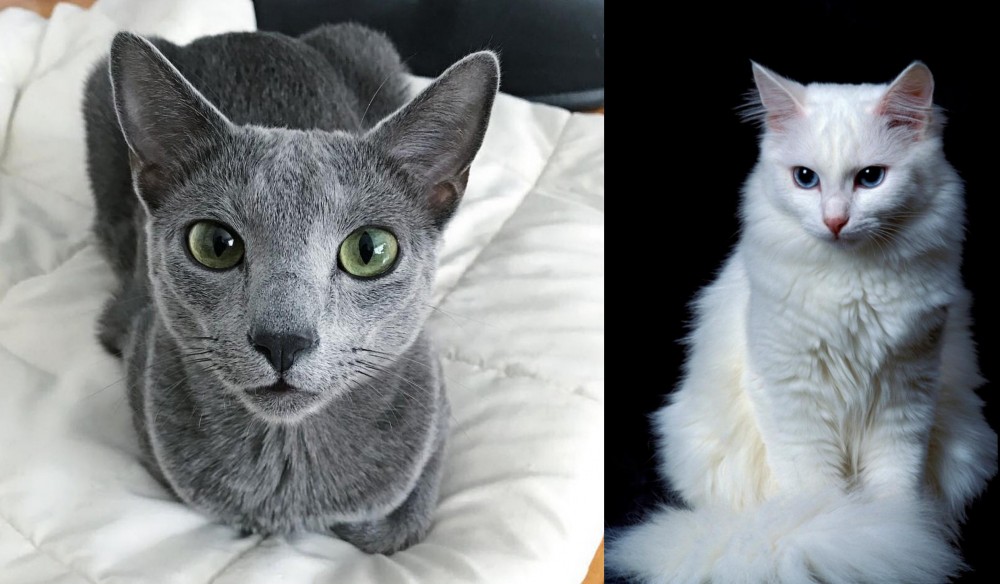 Blue Russian is originated from Russia but Turkish Angora is originated from Turkey. Both Blue Russian and Turkish Angora are of same weight. Both Blue Russian and Turkish Angora has almost same life span. Both Blue Russian and Turkish Angora has same litter size. Blue Russian requires Low Maintenance. But Turkish Angora requires Moderate Maintenance
Blue Russian is originated from Russia but Turkish Angora is originated from Turkey. Both Blue Russian and Turkish Angora are of same weight. Both Blue Russian and Turkish Angora has almost same life span. Both Blue Russian and Turkish Angora has same litter size. Blue Russian requires Low Maintenance. But Turkish Angora requires Moderate Maintenance
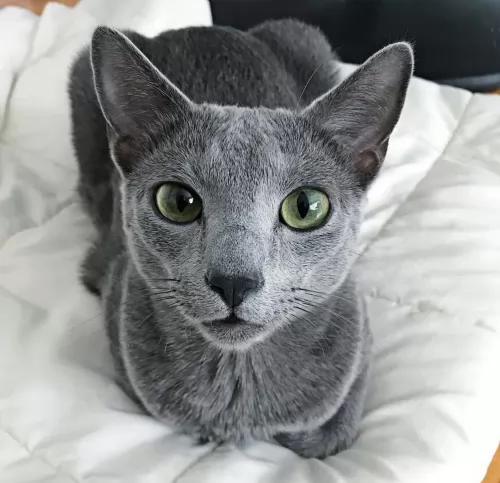 The Blue Russian is a rare cat and not much is known about its origins, but it is believed that the cat comes from northern Russia.
The Blue Russian is a rare cat and not much is known about its origins, but it is believed that the cat comes from northern Russia.
The Cat Fanciers Association believes that the cat descended from cats kept by Russian Czars. Research tells us that there is no mention of the Blue Russian until the 19th century. The Russia Blue made its first public appearance in 1875, being exhibited at London’s Crystal Palace as the ‘Archangel Cat’.
By 1912, the Russia Bue was given its own classification after its introduction to the USA in the early 1900s.
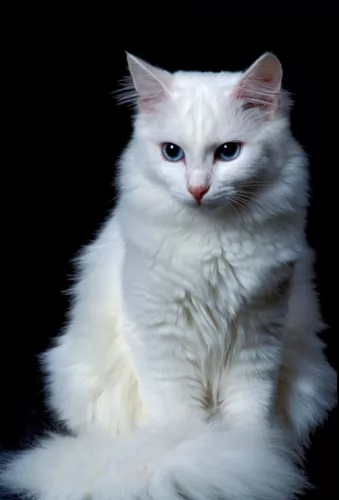 The Turkish Angora is a very old breed that naturally developed. It is thought that the breed developed in Turkey in the Ankara region formerly known as Angora.
The Turkish Angora is a very old breed that naturally developed. It is thought that the breed developed in Turkey in the Ankara region formerly known as Angora.
There are records that indicate that the Turkish Angora made an appearance in the UK as early as the 14th century already. Also, the beautiful longhaired cat was also introduced to the United States.
A breeding program was started for these cats in the early 20th century and it was then taken to Canada in 1963 and accepted as a championship breed.
While white was the only acceptable color at first, they now come in many different colors.
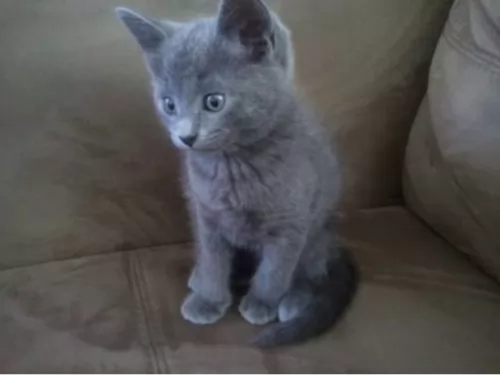 The Russian Blue is a medium-sized cat with a long, finely-boned boy. It is a slender cat, but he appears larger because of his dense double coat.
The Russian Blue is a medium-sized cat with a long, finely-boned boy. It is a slender cat, but he appears larger because of his dense double coat.
He weighs in the region of 3 – 6kg. In spite of the dense and luxurious short silvery coat, the cat doesn’t shed much. The coat can in fact be a silvery shade to a dark slate grey. The eyes are a beautiful green, the ears widely spaced and slightly rounded at the top.
The Russian Blue is a sweet-tempered cat who becomes attached to his human owner and who will even follow his owner much like a dog.
This particular cat breed may be quite shy, but he becomes social around his family members and may even be reluctant to share time with strangers.
He also doesn’t mind spending some time alone if you have to work. Curious and intelligent the Russian Blue is somewhat reserved but he makes a great companion as he is sensitive to his owner's moods.
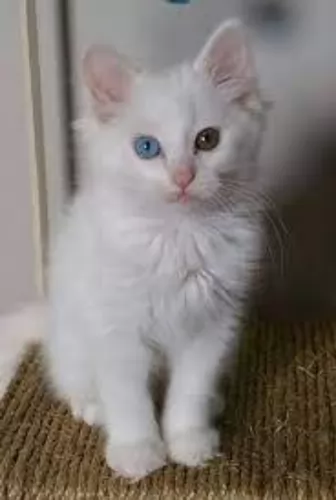 This is a medium-sized, muscular cat that can weigh between 3 and 6kg. It is a long-haired cat and the single coat has no undercoat.
This is a medium-sized, muscular cat that can weigh between 3 and 6kg. It is a long-haired cat and the single coat has no undercoat.
While the Turkish Angora is essentially white, its coat can come in a number of other colors.
The cat’s body if firm and fairly long, the legs are long with the hind legs being longer than the front legs, The tail is long and plumed, the head has large fairly pointed ears that can have tufts of fur. The eyes are large and almond-shaped and slant somewhat upwards. The color of the eyes can be blue, green, gold, amber.
This is a very active, athletic cat and he likes nothing more than to leap up on to high perches to survey his surroundings. They are intelligent, affectionate cats and they seem to gravitate towards one special human family member.
The cat is also protective of his human family. If any family member wants to stroke and pet them, they are absolutely delighted, just lapping up the attention.
They are smart enough to learn a few tricks too. They aren’t vocal cats but are sweet and quiet as well as being affectionate, making them perfect companions.
They don’t do well with changes, and a sudden change in his lifestyle can be upsetting for him.
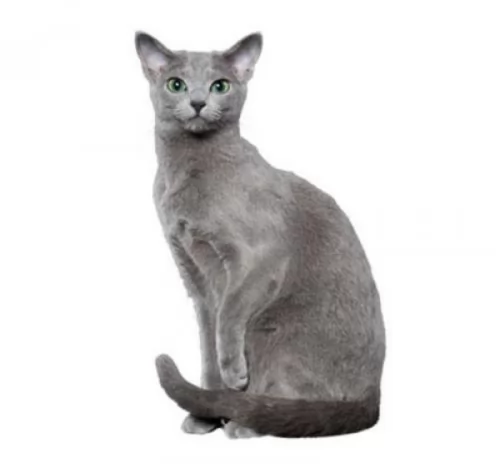 Russian blue cats are such intelligent creatures and he will require some mental stimulation because of it.
Russian blue cats are such intelligent creatures and he will require some mental stimulation because of it.
He loves mealtimes, but remember to not overfeed him as this shortens his lifespan.
He is a vocal cat and will tell you when he is hungry or he wants to play.
These cats don’t like too many changes so keep things the same for him.
When you try to keep your lovely Blue Russian happy, you’ll be rewarded by having a fantastic feline companion.
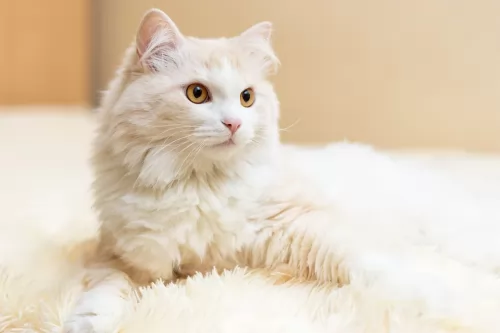 Beautiful to look at, this cat has got all the characteristics that make him a wonderful pet. He is playful well into adulthood and will love an assortment of stimulating toys to be amused by.
Beautiful to look at, this cat has got all the characteristics that make him a wonderful pet. He is playful well into adulthood and will love an assortment of stimulating toys to be amused by.
He is a sociable breed and doesn’t enjoy being left alone for hours. It would be far better to have another feline friend to keep him company.
Active and entertaining, you’ll be amused by your Turkish Angora and be so glad that you made the decision to bring such a charming creature into your home and heart.
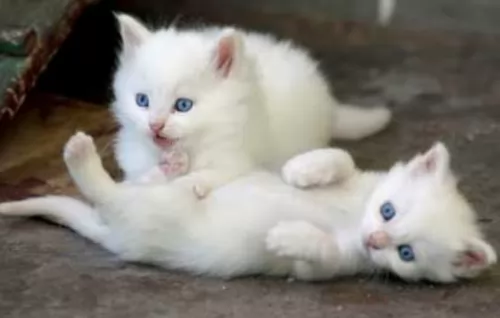 Turkish Angoras are generally healthy, but white cats with blue eyes can be prone to deafness. It is the W gene that is responsible for the white coat and blue eyes. Unfortunately, the presence of a blue eye can indicate deafness in the cat. But there are these cats that have 2 blue eyes and they have normal hearing.
Turkish Angoras are generally healthy, but white cats with blue eyes can be prone to deafness. It is the W gene that is responsible for the white coat and blue eyes. Unfortunately, the presence of a blue eye can indicate deafness in the cat. But there are these cats that have 2 blue eyes and they have normal hearing.
Another problem that has been seen in this beautiful cat breed is Ataxia which is a deadly neuromuscular disorder.
The most common sign of ataxia is an abnormal way of walking and the cat is actually unsteady on his feet. Sometimes the feet can even drag on the ground. Thankfully, screening has reduced the incidence of the disease.
Also, watch out for hypertrophic cardiomyopathy, a kind of heart disease that causes the heart muscle to enlarge.
Just remember that with a cat, diet can also play a huge role in the health of a cat. Your furry friend needs the right meaty foods with the right balance of nutrients to remain healthy and strong.
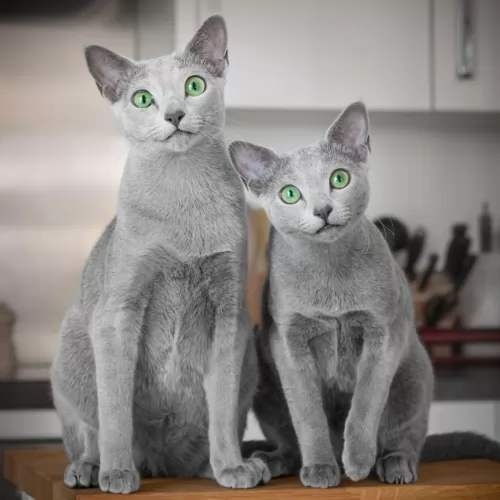 Part of caring for a cat as a responsible pet owner comes from feeding your pet. The Russian Blue is a cat that enjoys his food so you will have to look out for overfeeding.
Part of caring for a cat as a responsible pet owner comes from feeding your pet. The Russian Blue is a cat that enjoys his food so you will have to look out for overfeeding.
A cat that is overweight can start developing joint problems and diabetes. Rather stick to scheduled meals so that you can know exactly what your feline pet is getting. Such a beautiful cat needs the best food there is to keep the coat shiny and healthy and to prevent illness.
Always read the food labels to ensure the best ingredients and the right portion sizes. Make sure your cat gets food that is meat protein-rich as a cat is a carnivore.
Water is another important part of your Blue Russian’s diet. Fresh cool water should be available for your cat night and day. Water bowls are good but a water fountain is a tantalizingly attractive way for your pet to be attracted to drinking more water.
Make sure that you rake up all your cat’s droppings from the litter box every day as the Russian Blue is a hygienic cat and wants a clean litter box. Make sure the litter box is in a nice quiet spot for your cat.
The cat has a dense coat but isn’t a heavy shedder and requires very little grooming.
Ensure a decent bed for your Bombay cat. Any soft cat bedding will do, and while some cats like a simple flat mattress-type bedding arrangement, other cats like the idea of getting into a bed that provides some privacy.
You just have to find yourself a decent pet shop because when you do, you’ll find a host of soft, warm, fully washable blankets and pillows for your pet. Once you’ve decided on the right bed and a nice quiet spot, your cat will have a complex issue sorted out as some cats can be fussy with their sleeping arrangments.
Make sure your cat is neutered or spayed to avoid unwanted kittens. Neutering offers health benefits, reducing the risk of different cancers. Your cat also no longer has the desire to fight over mates and territory.
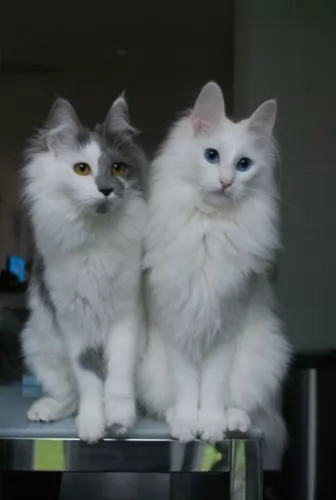 The Turkish Angora has a single coat and the lack of an undercoat makes it easy to brush him and keep the coat soft and silky. Also, the coat is only fully developed when the cat is about 2 years old.
The Turkish Angora has a single coat and the lack of an undercoat makes it easy to brush him and keep the coat soft and silky. Also, the coat is only fully developed when the cat is about 2 years old.
Check the inside of the ears. You may not want to clean them out yourself as you have to be very careful not to damage the ears. The vet and cat groomers can help you with this.
Keep your Turkish Angora’s litter box spotlessly clean. Cats are very particular about the cleanliness of their litter box and the feces will need to be removed every single day.